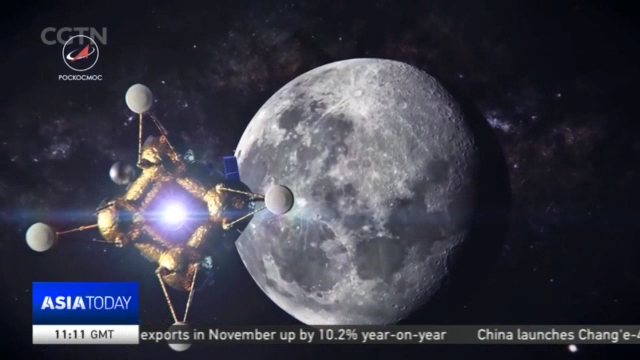
19:36, 08-Dec-2018
Lunar Exploration: Russia plans to build base on the moon by 2030
Updated
18:50, 11-Dec-2018
02:27

In the 1950s the former Soviet Union led the world in space exploration and the Luna 3 probe in 1959 took the first photographs of the far side of the world. Decades later, Russia still has ambitious goals in lunar research, as Julia Chapman reports from Moscow.
Earth's nearest neighbour has long been a subject of fascination. And Russia is no stranger to lunar exploration. The Soviet Union was the first country to reach the Moon. Its Luna 2 spacecraft crash landed there in 1959. Ten years later, U.S. astronauts were the first humans to arrive. To this day, no Russian cosmonaut has stepped foot on the Moon's surface.
DMITRY VELICHKO COSMONAUTICS MUSEUM GUIDE "Certainly, for the scientists there was a real furore, it was a triumph of science. Of course, it was a bit of a shame that they didn't do it themselves, the Soviet Union, Russia, but the contribution to science was enormous. And the American scientists were happy that the Soviet Union had produced research and discoveries for the first time in history."
In recent years, projects like the International Space Station have taken priority. And lunar exploration has been somewhat eclipsed. But Russia's space agency Roscosmos has big plans for the Moon. The next phase of its lunar programme is due to begin in three years. Russia aims to put cosmonauts on the Moon from 2030, and ultimately create a permanent base there.
JULIA CHAPMAN MOSCOW "For decades, lunar exploration has been overlooked in favour of other endeavours in space. Now, the moon appears to be coming back into fashion, with space agencies around the world refocusing their attention. But big-budget projects like the ones Russia has in mind can be difficult to justify."
This phase of lunar launches has already been delayed. And although it requires significant funding, scientists insist the project is worthwhile.
NATHAN EISMONT SPACE EXPERT "As for what we gain from studying the moon - there have been arguments, there still are. From one point of view, there isn't a clear scientific goal. But actually there is, it's just not obvious to the wider public. Following these tasks, you can consider development of technology that will allow for humans to fly to Mars. That's what Elon Musk is talking about. It sounds like science fiction, but the moon programme is needed so that it becomes a reality."
Mars may be a more distant target, but Russia has never been short on ambition. And as the world ramps up its lunar expeditions, space explorers continue to set their sights even higher. Julia Chapman, CGTN, Moscow.

SITEMAP
Copyright © 2018 CGTN. Beijing ICP prepared NO.16065310-3
Copyright © 2018 CGTN. Beijing ICP prepared NO.16065310-3